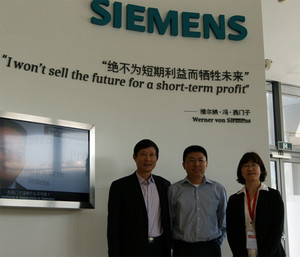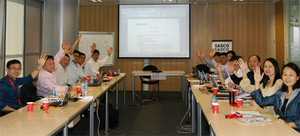https://www.dialog-igmetall.de/nachrichten/seminar-of-siemens-china-tu-chairmen
23.04.2024, 17:04 Uhr
Seminar of Siemens China TU Chairmen
- 17.06.2015
- International
From April 190th to 23rd 2015, employee representatives from China and Germany met in Beijing. Besides a workshop on collective bargaining strategies, the agenda included internal discussions about employee representation as well as a meeting with representatives of management and HR of Siemens China.
1. Workshop on collective bargaining
After Dr. Zhang’s opening remarks, Reinhard Hahn, IG Metall company officer for Siemens, held a speech pointing out the importance of networking among employees’ representatives across countries in order to balance globalized capital and reduce competition among locations. He stated that German employees’ representatives were happy to share their experiences with their Chinese colleagues and that the Chinese case could serve as a successful example of IFA implementation and therefore the whole process will be documented in three languages.
Mr. Pohlmann, head of the Friedrich Ebert Foundation’s Beijing office, which supported the workshop financially, expressed his satisfaction to see how the greater strategy of the umbrella trade unions in Germany (DGB) and China (ACFTU) are implemented into practice in this workshop. He praised the commitment of both IG Metall and the Chinese trade union chairmen to cooperation for the good of employees in both countries and expressed his hope for the establishment of a good social partnership with Siemens management in China.
In his introduction to the workshop program, trainer Wolfgang Müller pointed out huge similarities between German and Chinese trade union work. Both strive for a win-win-situation and respectful partnership with company management while trying to secure employees share in profits and safeguard their rights and interests.
Before starting with the workshop content, all participants were given the opportunity to introduce themselves and their locations with special regard to the situation of collective bargaining. Although large differences can be noted between locations due to regional disparities and the conditions of the various divisions, it also became obvious that there is a range of common problems. Especially as many local managers point to SLC management to avoid collective (wage) bargaining, it became clear that a national strategy was needed.
An active role play formed the center of the workshop. Participants were divided into three groups - employees, trade union representatives and managers in order to go through the whole process of collective bargaining from formulating positions through building up pressure up to reaching a compromise. These phases of role play were interrupted by input on the German collective bargaining system as well as Q&A sessions and discussions in which participants received feedback from trainers and could exchange views, reflect on their strategies and solve remaining questions.
2. Internal meeting of the employee representatives from China and Germany
In the morning of the third day, Harald Kern, chairman of the Siemens Europe Committee (SEC), presented codetermination in Germany and explained the structure of employee representation at Siemens.
Next, Harald Kern informed his Chinese colleagues about the developments at Siemens during the past two years, mainly presenting the proceedings of the Siemens 2020 program. He explained that the origin of this program lies with the German central works council which had developed a program called Siemens 2020 as a reaction to the Siemens 2014 program started by management which focused on short-term profits only. He went on to explain that the restructuring of the company and a new orientation towards long-term success by focusing on customers as well as employees was necessary. Now it is the task of employee representatives to use their codetermination rights to protect employees’ interests in this process. He explained that this is the reason that he came to this workshop alone, as his colleagues are currently negotiating with management about the reduction of 3.300 workplaces in Germany.
In the following discussion, it turned out, that the Chinese colleagues were as worried about the new status of Healthcare as their German counterparts. Harald Kern stated that the German management had postulated that these worries would be a particularly German phenomenon. This, however, was already proved wrong at a meeting in South Korea and reconfirmed in China. Harald Kern shared the information the management board gave to the German central works council concerning Healthcare, namely they had no plans to sell Healthcare and that there will definitely be no sale within the next three years. However, due to new developments, the market for healthcare products will change and the company wants to make sure to be able to react accordingly.
Following this, the Chinese Trade Union chairmen started to prepare their meeting with management representatives of Siemens China Limited. First, they decided on which topics should be addressed in this afternoon.
As they recognized that problems in China cannot be solved by the central works council in Germany, they decided to turn the Siemens China Trade Union Chairmen Community some more formal structure: recognition by management as first step, constitution as second step. They also expressed the wish to continue cooperation with the German central works council as well as IG Metall to gain support for their works.
Having made this clear, they decided on three main topics which should be addressed the same afternoon:
o Collective bargaining should be carried out at all locations
o Compensation and career develop scheme for blue-collar workers
o Siemens China Committee
The spokespersons explained that there had been previous talks with Ma Qing on the formation of a Siemens China Committee and that she had signalled agreement.
The chairmen decided to first have management recognize their Committee and address other issues later, as this structure would lay the foundation for future work.
3. Meeting of the employee representatives with representatives of the management as well as the Human Resources Department of Siemens
After lunch, Lu Di, Wang He and Wu Jingyan (HR representatives) joined the conference.
When giving a summary of the work the community has done during the past two years, Mr. Meng emphasized that the last two years of exchange showed that many locations have similar problems and that the SCC could also be a helpful platform for management to solve these problems. He related that a constitution had been drafted and discussed with Ma Qing. As the trade union in China is not very developed, he welcomed the support from the German works council and trade union for their work. Cheng Jinjun added that it would be good to keep Harald Kern as councellor.
Harald Kern emphasized that employee involvement can be a win-win situation. Although it might make some things more complicated, it also bears huge advantages.
Wang Jingyan explained that Ma Qing could not be present due to an appointment in Hong Kong, but that they would do their best to respond to participants’ questions. He presented the development of Siemens in China during the last year and the recruiting situation as well as recruitment and training strategies the management developed. According to Mr. Wang, Siemens China spends 40-50 million RMB on trainings and the corporate university of Siemens is among the ten best corporate universities in China. Now, the promotion of training opportunities stands in the focus, as many employees don’t know about them.
Addressing the trade union chairmen, he stated that the personnel department’s wish for further cooperation with the trade union representatives, in order to realize the vision of ownership culture set out in the Siemens 2020 program. According to Mr. Wu, the SLC management supports the chairmen’s wish to establish a more formal structure.
During the following discussion, management wished to clarify how often the committee intended to meet, how they planned to integrate the chairmen of other locations and inquired about the committee’s goals.
Having clarified their focal point, trade union chairmen raised different problems like the difficulty for them to do their work well while not being provided with the necessary information by local management, impediments for effective collective bargaining, etc.
Both sides emphasized that building trust is crucial for good cooperation and for achieving a win-win-situation. Chairman Zhang Li also stressed that it is also important to attain employees’ trust and continue the trustful cooperation with the German central works council.
After a short break the chairmen were asked for further remarks on the state of their work and other open issues. In their closing remarks, the HR and management representatives expressed their hope that the Siemens China Committee will become the new normality at Siemens. They emphasized that in their view, communication should go in all directions. As management can only communicate top-down, it relied on the SCC to supplement communication within SLC. They further expressed their hope that the establishment of a new platform for employee representation would help solving their problems of implementing general rules at all location.
Harald Kern closed the session by encouraging the trade union chairmen to clarify their agenda the next day and said that they should not be afraid to leave gaps, as those could be filled in later. He stated that he wishes both sides luck and success and pointed out that different interests should not be seen as problem but as adding spices and producing energy.
4. Internal closing meeting of employee representatives from China
Following opening remarks by Mr. Zhang, Mrs. Shen presented a thorough documentation of the coordinators’ work during the past two years and announced that all of the material would be made accessible to all participants.
Next, the chairmen discussed the draft of the constitution the coordinators had written and discussed with Ms. Ma Qing. After agreeing on several minor changes, the chairmen accepted the constitution unanimously by vote by hand sign.
All present chairmen announced their determination to inform all other employees’ representatives at their location by holding meetings as soon as possible. Moreover, they discussed the possibility to have similar workshops on collective bargaining as the one they had just attended at their locations in order to train their fellow trade union representatives.
When discussing further steps, they emphasized that as there was no legal foundation for their institution, they had to rely on building a good relationship to management. They defined their own role as serving as a bridge between SLC management and employees.
Before the end of the meeting, they also discussed a framework for collective bargaining drafted by the coordinators. Due to a lack of time, they agreed that chairmen should email their suggestions to the coordinators so that these can apply them to the draft.
5. Next steps
- Spreading knowledge on the Siemens China Committee
- Finalizing the draft on the framework for collective bargaining
- Providing participants with all relevant material
- Writing a documentation on the way of Chinese employees’ representatives at Siemens China towards their own nation-wide structure



